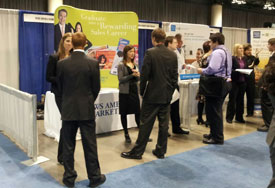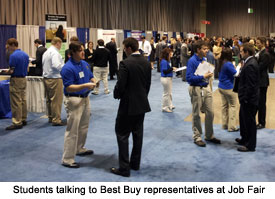
Making connections at the job fair
From the MNPCC Newsletter March, 2012
Related Newsletter: March 2012
 In a sea of black suit jackets, crisp white collars and oversized plastic nametags, hundreds of undergraduates filled the Minneapolis Convention Center on February 21 and 22. Résumés in hand, they eagerly visited the booths of more than 170 local and national employers, hoping their efforts would result in a second glance, a conversation or an interview — and maybe even a job or internship.
In a sea of black suit jackets, crisp white collars and oversized plastic nametags, hundreds of undergraduates filled the Minneapolis Convention Center on February 21 and 22. Résumés in hand, they eagerly visited the booths of more than 170 local and national employers, hoping their efforts would result in a second glance, a conversation or an interview — and maybe even a job or internship.Now in its 35th year, the Minnesota Private Colleges Job and Internship Fair provides a chance for undergraduates attending one of Minnesota’s 17 private colleges to interact with dozens of prospective employers all in one place — and it’s not just the job- and internship-seekers who appreciate the event. Minnesota-based businesses, governmental organizations and nonprofits also believe in the value of the fair.
Cathy Anderson, a recruiting coordinator from C.H. Robinson, a Minnesota-based transportation and logistics company, has participated in the fair for about seven years. “We’ve increased our space since we started coming, which gives us greater visibility,” she said. “It’s a high caliber of student that we see at this fair and the students seem well-informed, outgoing and high-energy.”
Nearly 2,000 students attended the two-day fair, which featured panel presentations on science-related careers and time to mingle at employer booths on the first day. The second day was reserved solely for employers to interview candidates they were interested in, though some impromptu interviews also took place on the first day.
Kyle Auringer, a biology major from Saint John’s University graduating this spring, attended the panels on science careers and said he found them helpful. “I used tips from the panels today,” Auringer said. “The panels were a nice reminder of what employers want to see.”
To prepare students for the fair, many colleges’ career centers offered supplementary résumé-editing workshops, mock interviews and reviews of job interview etiquette. They also encouraged students to learn about job fair employers ahead of time and even apply online beforehand.
The advance preparation impressed Ashley Laffen, a talent acquisition specialist with Enterprise, the nationally-known car-rental company. “I’ve been very impressed with students today,” she said. “There has been a lot of research done, and students have been really prepared.”
Employers offer internships, entry-level jobs
 At the 2012 job fair, the good news for job- and internship-seekers was that employers had a variety of opportunities available. Because many employers were hiring for different departments within a company, they were often looking for transferrable skills and abilities — and many said they weren’t as concerned about students’ majors as they were about the real-world experiences and skills they possessed.
At the 2012 job fair, the good news for job- and internship-seekers was that employers had a variety of opportunities available. Because many employers were hiring for different departments within a company, they were often looking for transferrable skills and abilities — and many said they weren’t as concerned about students’ majors as they were about the real-world experiences and skills they possessed.
 At the 2012 job fair, the good news for job- and internship-seekers was that employers had a variety of opportunities available. Because many employers were hiring for different departments within a company, they were often looking for transferrable skills and abilities — and many said they weren’t as concerned about students’ majors as they were about the real-world experiences and skills they possessed.
At the 2012 job fair, the good news for job- and internship-seekers was that employers had a variety of opportunities available. Because many employers were hiring for different departments within a company, they were often looking for transferrable skills and abilities — and many said they weren’t as concerned about students’ majors as they were about the real-world experiences and skills they possessed.“Majors are important, but fit is huge for us,” Anderson said. “We want a strong communicator, a strong multi-tasker and a probl em-solver.”
Anderson’s emphasis on general skills echoes what recent research says employers say they want in employees. According to the “Job Outlook 2012” survey conducted by the National Association of Colleges and Employers (NACE), employers are looking for candidates who can work on a team, are able to communicate well verbally, and can solve problems and make decisions. Such skills are often especially evident in students with a liberal arts background. “If someone has a political science background but wanted a sales position, we would look at everything they’ve done as a whole,” said Anderson.
Bridget Kane is a senior recruiter for Thomson Reuters, a New-York-based business data provider with offices in Eagan, Minn. She came to the fair with both internships and entry-level positions to fill. While some of these positions were in areas like IT (Information Technology) that require certain specific skills or majors, she said the sales and finance-related positions could be filled by a candidate from any major.
“The group today was prepared and could articulate what their interests were. That’s a big thing — can they articulate what they want and what they’ve done in the past?” Kane said. Many students she spoke with were finance majors, but Kane said she looks beyond major to GPA, internships and work experience when she glances through a résumé.
“It’s a tough sell if they’ve never worked before,” Kane said. “I also look for leadership skills and general involvement on campus that show they are willing to try something new and different.”
Laffen said she also seeks out the well-rounded student. “I’m looking for that person who has great leadership skills, is professional and knows why they are standing in front of you. Do they have any customer service skills? What activities were they involved in? That tells us a lot about their ability to manage time, or whether they can speak in front of people.”
Both Anderson and Laffen also emphasized that their internships are designed to give candidates the real experience of what it is like to work at their company, rather than providing months of practice getting coffee and filing papers.
“We don’t hold anything back from our interns,” said Laffen. “We provide them the same training as our entry-level positions.”
And students who are lucky enough to get an internship just might end up with an eventual job offer.
“Once we hire interns for the summer, it’s full immersion,” said Matt Dorsey, a business analyst at C.H. Robinson. “We could potentially offer them a job.”
Tips from employers at the 2012 job fair
Tip #1: Have a focus or career goal in mind
Job fair employers said that it’s unappealing when students say they are open to any sort of job, or that they don’t really know what they want to do. Students who aren’t yet sure what kind of job they want should come up with a focused answer, rather than saying they just want a job.
Job fair employers said that it’s unappealing when students say they are open to any sort of job, or that they don’t really know what they want to do. Students who aren’t yet sure what kind of job they want should come up with a focused answer, rather than saying they just want a job.
Tip #2: Demonstrate strong communication skills
Regardless of their role, students need to be good communicators. This means being confident enough to walk up to a recruiter at a job fair, hand them a résumé and talk about experiences that relate to their company or the position that is available.
Regardless of their role, students need to be good communicators. This means being confident enough to walk up to a recruiter at a job fair, hand them a résumé and talk about experiences that relate to their company or the position that is available.
Tip #3: Include all of your work experience on your résumé
An employer only knows what is listed on a student’s résumé — so students should include all of their work experience, even jobs as a bartender or door-to-door salesperson. Some students shy away from listing work experiences that aren’t related to their majors, but those kinds of jobs stand out.
An employer only knows what is listed on a student’s résumé — so students should include all of their work experience, even jobs as a bartender or door-to-door salesperson. Some students shy away from listing work experiences that aren’t related to their majors, but those kinds of jobs stand out.
Tip #4: Show them leadership skills
Students should be sure to include the year they spent as treasurer of the French Club on campus, because the organization or context of a candidate’s leadership position matters less than the fact that they can take charge.
Students should be sure to include the year they spent as treasurer of the French Club on campus, because the organization or context of a candidate’s leadership position matters less than the fact that they can take charge.
Tip #5: Do your homework
Students who applied for open positions on a company’s website ahead of time were one step closer to getting an interview at the job fair, several employers said. In one instance, a student approached an employer’s booth knowing the title of a job that was open and having already applied online. When this student suggested an interview, she got one because she had already completed the first steps in the hiring process.
Students who applied for open positions on a company’s website ahead of time were one step closer to getting an interview at the job fair, several employers said. In one instance, a student approached an employer’s booth knowing the title of a job that was open and having already applied online. When this student suggested an interview, she got one because she had already completed the first steps in the hiring process.